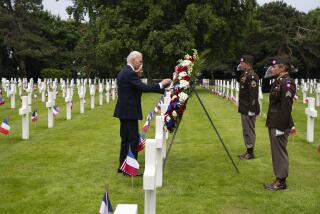Our suicide pact with Al Qaeda
- Share via
After the Sept. 11 attacks, Osama bin Laden told an Al Jazeera interviewer that “the values of this Western civilization under the leadership of America have been destroyed. Those awesome symbolic towers that speak of liberty, human rights and humanity have been destroyed.... I tell you, freedom and human rights in America are doomed.”
The attacks on New York and Washington four years ago were unimportant in their own right, Bin Laden was saying. Most important was the course of action he hoped they initiated: The West would destroy its own freedoms.
In taking on Al Qaeda, do we risk altering our basic character, as Bin Laden predicted?
The terror mastermind’s statement has been widely understood as a description of asymmetric warfare -- a situation in which a military handicap is converted into an advantage. Al Qaeda’s lack of an organized fighting force is a strength because it possesses neither territory nor a headquarters that the U.S. military can target. Unable to militarily attack or defend itself against the terror network’s dispersed resources, the United States is forced to protect itself by curtailing its freedoms in the name of national security, creating a paradox: A freedom defended is a freedom diminished. It is a form of suicide that mirrors the jihad’s suicidal techniques.
But even this understanding views Al Qaeda’s actions in terms of old-fashioned military strategy, in which disabling the state is of paramount importance. Precisely the opposite is true. Al Qaeda is not simply out to disable the U.S. It also seeks to destroy the democratic freedoms by which the West defines itself. For Bin Laden, these freedoms are based on the un-freedom of Muslims, whose natural resources, principally oil, the U.S. must secure to guarantee its prosperity and power. Destroying the identity of the West -- its democratic freedoms -- would expose its hollow and hypocritical nature. Paradoxically, for this to happen, the U.S. needs to become, in the short term, more rather than less powerful. That way it can extinguish its liberties more effectively.
Bin Laden’s belief that the damage Al Qaeda inflicted on 9/11 was minor compared with what the U.S. would impose on itself illustrates the speculative role he envisions for his network. The attacks were simply an initial investment in terror. If Al Qaeda can neither control nor direct the global consequences of its actions, it engages in little more than gestures of risk. But its actions also are gestures of duty, nowhere more so than in suicide bombings, in which the possibility of militants gaining anything by their acts is spectacularly destroyed. One of the purposes of “martyrdom” operations is to demonstrate the otherworldly nature of the jihad.
Here a virtue is made out of necessity. Suicide bombing as an ethical, rather than political, act exposes Al Qaeda’s inability to control its own theater of operations. Because they abandon responsibility for their consequences, all jihadistic practices assume primarily ethical significance. However immaculately planned, Al Qaeda’s actions are only gestures toward goals it cannot achieve, including the elimination of U.S. influence in the Muslim world and the annihilation of the corrupt governments that administer Muslim countries. In this sense, they resemble the ethical gestures of global movements generally, which also operate in arenas they do not control.
Perhaps this is the fate of all global movements whose actions cannot produce political results in the traditional sense of achieving goals. Because of this, their practices are self-referential, gestures of risk and duty in an ethical rather than political sense. This is why these movements are characterized by diverse memberships that are united neither by ideology nor class. The jihad’s lack of a coherent vision for the future makes it the most individualistic of movements, held together as a network rather than as a political organization. Al Qaeda’s members possess no cultic uniformity. Its leaders disagree on religious as well as political grounds. What unites them are broad patterns of thought and practice individually adopted rather than inculcated through indoctrination.
Earlier movements of resistance or terror -- communist, anarchist or utopian -- criticized existing conditions and offered alternatives. Al Qaeda’s jihad does not offer any coherent vision of a utopian future, focusing instead on murder as a duty in its own right. Deprived of traditional forms of political unity or collective action, its militants live scattered among their enemies, whom they accuse only of heedlessness and hypocrisy. Such global movements as Al Qaeda don’t seek an alternative to America so much as the fulfillment of America’s promise of freedom for all.
Bin Laden’s rhetoric has featured a call for global equality between the Islamic world and the West. Having accused the U.S. of hypocrisy in this regard, he turns his attention to the only form in which such freedom is possible: the equality of death. This is why he repeatedly emphasizes the need for an equivalence of terror between the Muslim world and the U.S., as if this were the only way the two might come together and even communicate. For Al Qaeda, terror is the only form in which freedom and equality are now available. The network therefore functions as the dark side of American democracy, as inseparable from it as its evil twin. America’s “suicidal” strategy of curtailing liberties brings the United States within hailing distance of an equally suicidal Al Qaeda. Both suicides represent the equality of death, which stands in for a global democracy for which no political form yet exists.
More to Read
Sign up for Essential California
The most important California stories and recommendations in your inbox every morning.
You may occasionally receive promotional content from the Los Angeles Times.










